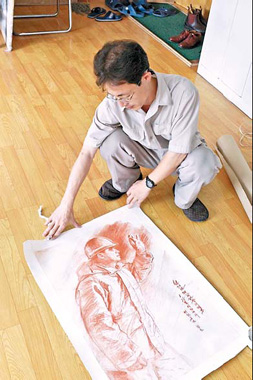Australia accused of censorship over Pyongyang art exhibit
Australia was accused of censorship yesterday after it denied visas to Democratic People's Republic of Korea artists invited to a rare international exhibition of their work, saying their studio is a propaganda tool of their country's government.
The co-curator of the exhibition said the works were nonpolitical, and that letting them be displayed while banning their creators from entering the country so they could talk about them did not make sense.
Five artists from the Mansudae Art Studio were invited to the Asia Pacific Triennial of Contemporary Art in the eastern city of Brisbane to talk about their paintings and drawings that are part of the exhibition, which includes work from more than 100 artists from 25 countries in the region.
The DPRK remains one of the most isolated countries in the world, with the average citizen prohibited from accessing the Internet as well as outside phone networks, radio and TV.
 |
|
In this undated photo provided by Queensland Art Gallery, DPRK artist Choe Chang Ho holds his sketch. [AP] |
In recent years, cultural and sporting events have provided the best opportunity for "soft diplomacy." The New York Philharmonic performed in Pyongyang in 2008, while DPRK athletes, from gymnasts to football players, have served as international ambassadors.
Foreign Minister Stephen Smith rejected the artists' applications for an exception to the government's visa ban on the DPRK, part of targeted sanctions in response to the country's efforts to build nuclear weapons.
Smith said in a statement that issuing visas for Mansudae studio artists would have sent the wrong message.
"The studio reportedly produces almost all of the official artworks in North Korea (DPRK), including works that clearly constitute propaganda," the statement said.
Some of Mansudae's approximately 1,000 artists devote their time completely to painting portraits of Kim Il Sung, the late founder of the state who handed power to his son.
Nick Bonner, a Beijing-based British businessman and art dealer who helped curate the exhibition, said all art studios in the DPRK - like most other things in the state - were government organizations, but that did not mean every work was political.
One large mosaic depicting a scene in a steel mill is from the socialist realism that is often associated with the country, Bonner said. The rest, including portraits and landscapes in ink or oil paint, were the artists' individual works.
"There's no way on earth that any of the pieces we commissioned for the inks and oils can in any way resemble propaganda," Bonner said. "It's fine art we are talking about.'"
The artists were extremely disappointed in Australia's decision, after spending weeks getting DPRK authorities to approve passports, he said.
"For an artist to produce a body of work and not be able to speak about it, that is censorship," Bonner said.
Australia, one of the United States' closest allies in the Asia-Pacific region, has diplomatic ties with the DPRK, but they are prickly. Canberra froze relations in 2002 and imposed limited sanctions and the visa ban in 2006 in response to the DPRK's attempts to go nuclear. The DPRK closed its embassy in Canberra last year, citing financial reasons.
 0 Comments
0 Comments






